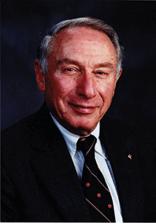
Floyd Dunn, a ground breaking pioneer in the science of ultrasound and bioacoustics, died on Jan. 24, 2015. A veteran of the World War II Battle of the Ardennes, he was 90 years old. {mprestriction ids="1,3"}His death comes 30 days after that of his wife, Elsa.
Floyd Dunn attended the University of Illinois at Urbana-Champaign in the Department of Electrical & Computer Engineering, earning three degrees, including his Ph.D. in 1956. He remained at the U of I for 50 years and retired in 1995. In an era that often shuns basic research, he shepherded, almost single-handedly at times, a discipline that made way for the safe, commercial development of a stunning array of today’s ubiquitous devices. These include ultrasonic imaging used for prenatal sonograms, the ultrasonic microscope and numerous measurement tools.
For more than 20 years, he directed the U of I’s Bioacoustics Research Laboratory. From a converted, 19th century power plant deep inside the engineering campus, he mentored generations of students some of whom preceded him into retirement. His recognized contributions afforded him decades of opportunities to teach and lead research in the U.S., United Kingdom, and for more than 40 years, in Japan.
A member of both the National Academy of Sciences and the National Academy of Engineering, Dunn was also the past president of the Acoustical Society of America. He was a recipient of the IEEE Edison Medal, the ASA Gold and Silver Medals as well as the AIUM Joseph P. Holmes Basic Science Pioneer Award and delivered the William J. Fry Memorial Lecture. He served on several FDA and NIH committees and was a member of Committee 66 of the National Council on Radiation Protection.
In retirement Professor Dunn continued to contribute to the work of his colleagues, and he carried an appointment at the University of Arizona-Tucson. He edited peer reviewed scientific articles and, until 2013, consulted with private companies interested in using ultrasound.
Floyd Dunn, (he had no middle name), was born in Kansas City, Mo., in 1924. He was the son of Russian immigrants, whose home village would today be in Ukraine but had also at various times been part of Poland. He was a true child of the Great Depression. His father, a watch maker, pieced together a living but only just. Floyd and his younger brother, Marvin, shared a second floor, enclosed porch with a decidedly thin down comforter against the harsh Missouri winters.
Floyd Dunn was introduced to Elsa shortly after his service in World War II, and they were married for more than 64 years. Elsa Dunn died on Dec. 26, 2014.
Floyd and Elsa Dunn shared an interest in travel, and for half a century, she was his frequent travel partner, accompanying him to meetings beginning with his return to Europe in 1965. While on a business trip, just 19 years after the end of World War II, he renewed wartime acquaintances with friends who’d supported the Allies as members of the Belgian Resistance.
Dunn was an avid reader and scholar of the works of James Joyce. Over the course of many years, he amassed a sizable collection of his works, including a rare photo reproduction of Joyce’s handwritten manuscript of “Ulysses.” Floyd and Elsa were “early adopters” who, as the first “class” of Splendido-Tucson members, selected their residence before construction was completed.
Floyd Dunn is survived by his daughter Andi Dunn, his son, Roo Dunn, and five grandchildren. Among his grandchildren and extended family are a nurse in the U.S. Army and grandnephew in Special Forces. It was discovered sometime after World War II that Floyd had only one kidney and that he could expect to live to about age 70. The family appreciates the longtime friendship and counsel of Dr. Amit Fadia and he received outstanding care in the last few weeks from Right at Home-Tucson.
Asked recently what helped make his career successful, Professor Dunn said without hesitation, “We came home from the war tired, scared and without a penny to our names. I would not be here today, and I would not have achieved all of this, if there had not been the GI Bill.”
As a member of the Willed Body Program at the University of Arizona — College of Medicine, Professor Dunn will continue to inspire a new generation of science pioneers, as was he, nearly seven decades ago.
Friends are encouraged to make contributions in Floyd’s memory to the Community Food Bank of Southern Arizona at www.communityfoodbank.com/donate or by calling 520-622-0525.{/mprestriction}